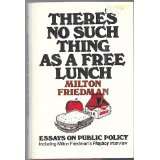
Αναζητώντας την προέλευση της έκφρασης There's no such thing as a free lunch, ανακάλυψα ότι δεν είναι πρωτότυπη έκφραση του Μίλτον Φρίντμαν (κι ας την είχε πιπίλα) αλλά ούτε και ο Χάινλαϊν την επινόησε. Η πιθανότερη εξήγηση για την προέλευση της έκφρασης μάς πηγαίνει στα μπαρ του Φαρ Ουέστ, όπου το γεύμα ήταν δωρεάν αν κατανάλωνες πάνω από μια συγκεκριμένη ποσότητα οινοπνεύματος — στο τέλος ανακάλυπτες ότι σου ερχόταν η μια η άλλη.
Στα αγγλικά:
There’s no such thing as a free lunch
There ain’t no such thing as a free lunch
There’s no such thing as a free meal
Ελληνικές αποδόσεις:
Τίποτα δεν είναι δωρεάν
Το τζάμπα πέθανε (αλλά μην το πείτε στη μάνα του
Όπως συμβαίνει σχεδόν πάντα (και όπως δίδαξαν οι πρόγονοί μας), κυκλοφορεί και η έκφραση με την αντίθετη σημασία: The best things in life are free. Πιστεύω ότι αυτή έγινε δημοφιλής (αν δεν ξεκίνησε κιόλας) ως τίτλος τραγουδιού από το μιούζικαλ του 1925 Good News των Ray Henderson & Buddy DeSylva. Σας καταθέτω παρακάτω εκτέλεση του 1928, αλλά το YouTube φιλοξενεί εκτελέσεις με μεγάλα ονόματα (Κρόσμπι, Μάριο Λάντσα κ.ά.).
Αλλά να επιστρέψουμε στο δωρεάν γεύμα. Έχουμε αρκετές χρήσεις στο Dictionary of Proverbs και ο Safire στο λεξικό του περιλαμβάνει αναλυτική παρουσίαση.
Μου άρεσε το παρακάτω απόσπασμα από το βιβλίο Free Lunch του David Smith, που περιλαμβάνει και την ιταλική (λατινική τη λέει!) έκφραση «È finita la cuccagna!» (The party’s over).
[…] the one snappy phrase from economics most people will have heard of, even if they are unaware it has anything to do with the subject, is: ‘There’s no such thing as a free lunch.’ You never, in other words, get something for nothing. As I am a journalist often required to lunch, not always enjoyably, it has always been close to my heart. It is such a famous phrase, incidentally, that its origins are unclear. While it is often attributed to the American economist Milton Friedman, of whom more later, the Oxford Dictionary of Quotations lists its authorship as Anonymous, first coming into circulation in American university economic departments in the 1960s but making it into print, not in a textbook or learned article, but in The Moon is a Harsh Mistress, a 1966 novel by the science-fiction writer Robert Heinlein. It is likely, however, that the phrase was in use much earlier than this. The San Francisco News used it in a 1949 editorial, itself reputed to be a reprint of one written in 1938, while the legendary New York mayor Fiorello La Guardia said it in 1934, albeit in Latin (È finita la cuccagna!). As for the origin of the idea, bars in the west of America commonly offered free lunch to patrons buying a certain amount of alcohol. Those who stayed sober soon worked out that they were paying for their lunch with what they were being charged for beer or whisky.
Άλλες πηγές:
http://en.wikipedia.org/wiki/There_ain't_no_such_thing_as_a_free_lunch
https://www.google.com/search?q="thing+as+a+free+lunch"&btnG=Search+Books&tbm=bks&tbo=1
Νιώθω υποχρεωμένος να καταθέσω και το απόσπασμα από το The Moon is a Harsh Mistress του Χάινλαϊν:
"Gospodin," he said presently, "you used an odd word earlier--odd to me, I mean."
"Call me 'Mannie' now that kids are gone. What word?"
"It was when you insisted that the, uh, young lady, Tish-- that Tish must pay, too. 'Tone-stapple,' or something like it."
"Oh, 'tanstaafl.' Means 'There ain't no such thing as a free lunch.' And isn't," I added, pointing to a FREE LUNCH sign across room, "or these drinks would cost half as much. Was reminding her that anything free costs twice as much in long run or turns out worthless."
"An interesting philosophy."
"Not philosophy, fact. One way or other, what you get, you pay for." I fanned air. "Was Earthside once and heard expression 'Free as air.' This air isn't free, you pay for every breath."
Καπάκι το αντίδοτο: The best things in life are free (Are they, though?)

